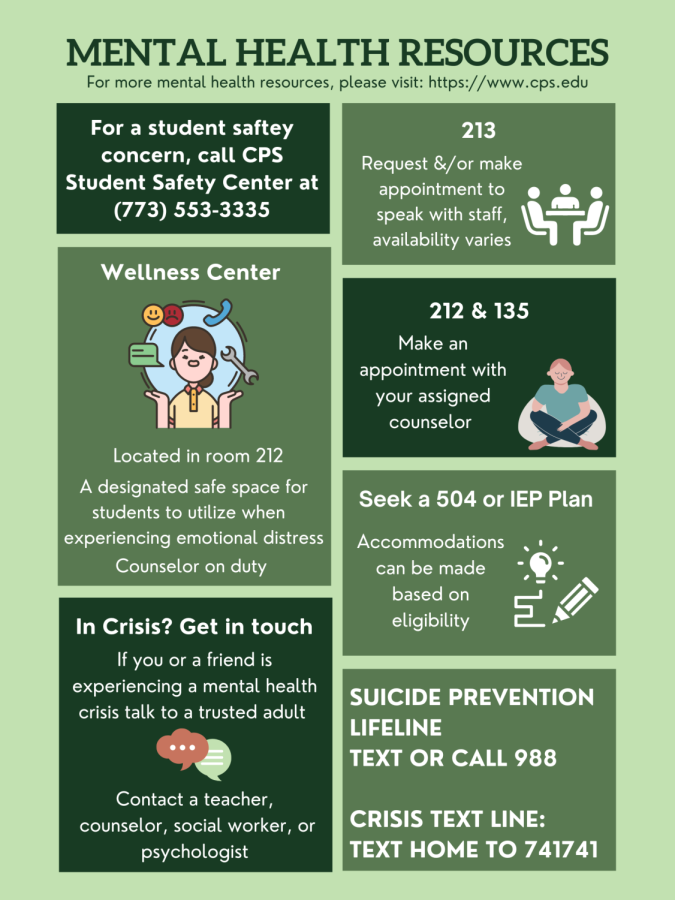A glance at Lane’s mental health resources
Sources: Lane Tech Student Wellness Brochure (https://lanetech.org/wp-content/uploads/2023/03/Student-Wellness-Brochure.pdf), Laura McLaughlin-Kantowicz.
May 25, 2023
Near the beginning of her sophomore year at Lane Tech, Sadie La Prairie, with the help of her parents, reached out to a social worker to talk about certain accommodations that could help her learn as well as her peers.
“I was having a hard time getting work in on time and going to class,” La Prairie said.
At times, anxiety can interfere with her ability to perform well academically and without extra support and patience from teachers, she stands the risk of falling behind in class. However, under a 504 plan based on her diagnosis, La Prairie receives certain accommodations such as extensions on assignments if needed.
According to Lane Tech social worker Laura McLaughlin-Kantowicz, anxiety can impact a person’s behavior and impede on their ability to complete certain activities.
“If you’re anxious, it’s very hard to see the benefit of doing something else, because you’re stuck in your anxiety, and your brain really doesn’t allow you to make good decisions,” McLaughlin-Kantowicz said.
Per her 504 plan, La Prairie said she is connected to an in-school social worker, with whom she can work through any issues concerning her mental health. If needed, La Prairie also has access to the crisis counselor office located in Room 213, where she can take a break or check in and talk to somebody. Students without a 504 Plan may also utilize the space throughout the day, however, there is no guarantee that staff will be available.
In addition to the crisis counselor office, the Wellness Center, located in Room 212, is a safe space within the school for students experiencing emotional distress. According to the student wellness brochure available on the Lane Tech website, students who visit the Wellness Center have the opportunity to utilize coping skills and strategies to lessen the symptoms of distress.
A student may also acquire a 504 or an IEP plan to receive certain accommodations and ease their learning process. According to CPS, an IEP is developed for a student who needs specialized services. A student can acquire an IEP after the student is evaluated by qualified professionals and qualifies for special education and related services. An IEP is reviewed periodically and changed as needed.
Additionally, CPS states that a 504 Plan has a wider range of students who can qualify for accommodations. A 504 plan is less restrictive than an IEP, so students who may not be eligible for an IEP plan may still receive certain accommodations under a 504.
According to CPS, a 504 plan is developed to provide additional help to students with a disability and ensure they receive an efficient learning environment in which they can succeed academically. Certain accommodations under a 504 can include, but are not limited to, time extensions on exams and assignments and changes to class schedules, grades and homework assignments, etc.
Additionally, Lane Tech staffs a certain number of teachers, counselors, psychologists and social workers who can assist students who are struggling with their mental health.
“Teachers are the front lines in providing support to kids in the classroom if they see any signs of mental health challenges,” psychologist Kevin Kahler said. “Teachers are also the front lines for referring for more support. I would say the next level is your counselors where they would be kind of the first step into maybe more intensive support if students need it. They can offer social emotional counseling, as well as problem solving, offering resources and things like that.”
According to Kahler, if, through further discussion with team members, the problem requires more direct social emotional support and problem solving, the situation is then taken to social workers, the most intensive line of support. While psychologists do provide mental health counseling they also have a major responsibility to the special education system.
Despite improvements made by Lane Tech, certain areas, such as accessibility to resources, have room for further improvement.
“We have room to grow, we’ve made improvements, but we definitely have room to grow,” McLaughlin- Kantowicz said. “And I want to build more accessibility. And we’re still figuring out how to do that.”
According to La Prairie certain improvements can be made in regards to sensitivity training for staff. La Prairie said that teachers can be dismissive of students and at times may not understand that mental health and mental illness is an issue in general.
“I think Lane Tech could definitely improve on mental health training for staff members, because I’ve experienced a lot of extremes in the ways that different staff members and teachers approach the subject of mental illness and mental health,” La Prairie said.
Kahler said that teachers are at the front lines in providing support and noticing certain struggles students may be facing. For many students, teachers can provide support and refer those who require additional support to specialized staff members.
“It can make an astronomical difference when a teacher reaches out, notices there’s something going on with a student and offers to help them because then they can actually, you know, learn and be comfortable in their environment,” La Prairie said.
Located in the crisis counselor office, McLaughlin-Kantowicz also does professional development for staff, mainly regarding mental health and social emotional learning.
“If the student does not feel safe in your classroom, or that they belong in your classroom, then it’s going to be much more difficult for you to teach that student anything academic, because they’re not going to be able to take academic risks as much as they would if they did feel safe,” McLaughlin-Kantowicz said.
Similarly, Kahler said students need to feel present and that they are in a good place. When a student struggles with mental health, there is often an impact on their academic achievements and overall classroom performance.
However, both Kahler and McLaughlin-Kantowicz suggest students get mental health support outside of school.
“We’re not like an intensive treatment program,” Kahler said. “A lot of times, we’ll recommend outside services if kids require more intensive treatment. We’re more, I think, the front lines in school to, again, offer support with our training, be knowledgeable on what are good ways to problem solve, just to use helpful strategies and techniques to help you throughout the school day.”
Receiving additional mental health support outside of school can help students build coping skills and learn new strategies to improve their current state and well being, according to McLaughlin-Kantowicz.
Although La Prairie said support from within the school is vitally important she also mentioned the importance of receiving additional support outside of school.
“So my personal experiences with multiple mental illness diagnoses, is that it’s really vital to receive external support on mental illness and just awareness around the subject,” La Prairie said.






